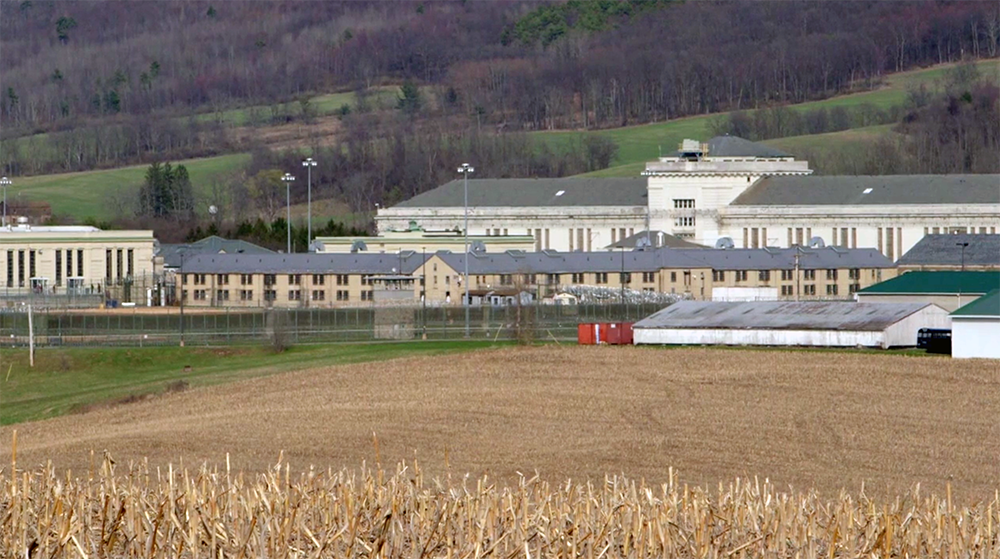E had called to give a heads up.
“I may not be in contact for a few weeks,” he said. The Pennsylvania Department of Corrections (DOC) was transferring people from his prison, SCI Rockview in Bellefonte, Pa., to other prisons throughout the state.
 It had started Sunday without warning, he said. No one knew who was being chosen or why, whether the moves were temporary or permanent, nor how many were going to be transferred. They weren’t sure if the transfers were happening because of the coronavirus pandemic or in spite of it. He had no clue if he would be chosen and if he was, he wasn’t sure when he’d be able to reach out next. A few people from his block had already been transferred and he assumed people he knew in other blocks had been too.
It had started Sunday without warning, he said. No one knew who was being chosen or why, whether the moves were temporary or permanent, nor how many were going to be transferred. They weren’t sure if the transfers were happening because of the coronavirus pandemic or in spite of it. He had no clue if he would be chosen and if he was, he wasn’t sure when he’d be able to reach out next. A few people from his block had already been transferred and he assumed people he knew in other blocks had been too.
“I really have no idea whether or not they're still here or whether or not they've been selected or what’s going on,” he said.
The prison had spent the past month under quarantine — basically the equivalent of being locked down — to prevent the spread of the coronavirus. Most of E’s time was spent in his cell with his cellmate. They were able to get out a few times a week to go out in the yard or go to the law library. He’d fallen back on coping mechanisms he’d developed after spending nearly two years in solitary confinement as a juvenile in an adult county jail. But he understood the restrictions were necessary to keep everyone safe from the virus.
“I was starting to think everything was going pretty smooth relatively,” he said about the DOC’s response to the coronavirus. “And then they throw this curve ball in the mix.”
E, whose name is being withheld to protect his identity, was incarcerated more than a decade ago when he was a juvenile. He has spent the better part of his life sentence inside SCI Rockview.
Normally when something this big happens — transfers, policy changes, what have you — there’s warning, he said.
“There’s some sort of rumor that comes beforehand. Like you know somebody will let it slip through the cracks,” he said. “This just literally came out of left field.”
Now that the transfers have begun, the rumors are flying. At first he heard that 250 people in all would be transferred, which out of about 2,500 isn’t bad, he said. But then he heard that it would be 250 per block — half the population of the block he lives in.
“I really don’t know what’s going on,” he said. “Just trying to hope that I’m not one of the few that gets kidnapped.”
Confusion and concern
In the last month, 205 inmates have been transferred from SCI Rockview, according to the DOC’s population report included in their COVID-19 updates. In the last week there were 168 transfers. In contrast, the prison with the second highest number of transfers in the last week was SCI Phoenix in Collegeville, which transferred 23 people. (A small percentage of these numbers could be releases.)
The transfers come when people — incarcerated or not — are encouraged to stay put to prevent the spread of COVID-19. They have caused confusion and uncertainty for inmates whose lives revolve around routine. They have caused concern among their family members who worry about their loved one’s ability to protect themselves from the virus while behind bars.
Public health experts and corrections officers both question and condemn transfers now, citing the risks they pose for spreading the virus between facilities and infecting inmates and corrections officers alike.
Prisons run by the DOC have been in a statewide quarantine since March 29, the day that they confirmed their first positive case of COVID-19 — a prisoner at SCI Phoenix. Since then 47 inmates and 90 staff have tested positive for COVID-19 as of Wednesday night, according to the DOC website. SCI Rockview has only one staff member and no inmates who have tested positive.
In response to questions about whether the transfers were part of the department’s response to the coronavirus pandemic, Department of Corrections Press Secretary Maria Finn wrote in an email:
“We don’t comment on specific transfers, however, in every media briefing Secretary [of Corrections John] Wetzel discussed the need to strategically reduce population on certain housing units throughout the system to achieve social distancing. We plan to continue to do that as we reconfigure our operation to better manage COVID-19.”
SCI Rockview is a medium-security prison located near State College. According to the March 31 population report, it is currently at 102.7% capacity.
The Pennsylvania State Corrections Officers Association has come out against transfers, saying they believe it is too dangerous to continue them during the pandemic.
“The PSCOA called for an end to prison transfers a month ago,” said PSCOA President Larry Blackwell in an emailed statement. “It continues to be frustrating to see the commonwealth do this, while the rest of the state is virtually shut down. The department should be more transparent on these transfers during a pandemic. People have a right to know what is happening in their communities.”
A difficult position

Drexel University
Joseph Amon
Public health experts do not understand what makes certain prisons more susceptible to large outbreaks of COVID-19, said Professor Joseph Amon, the director of the Office of Global Health at Drexel University’s Dornsife School of Public Health. Preventing its spread within and between prisons protects inmates, the corrections officers and the communities that the officers return home to after their shift.
Reducing populations within prisons through transfers is the “right instinct” but is not enough on its own, he said. Without making sure that those transferred are tested, properly screened and then quarantined before entering the new prisons, the transfers could actually do more harm than good.
“There's a lot of different steps that need to be taken beyond just looking at overall numbers.” Amon said. “If they’re not putting in place all of those steps in addition, then there is a risk that you will be magnifying transmission and not controlling it.”
For transfers to reduce populations and promote social distancing, the DOC would need to dramatically increase testing, he said. Pennsylvania’s prisons aren’t testing widely enough to know the true extent of the viruses reach within prison walls. He pointed to Marion Correctional Institute in Ohio which, after testing all their inmates, found that more than 80% had the virus.
Screenings should include very direct questions about every symptom associated with COVID-19, not just cough or fever, Amon said. He emphasized that focusing on symptoms is not enough, given that asymptomatic and presymptomatic people are contagious as well. He also said that asking someone if they’ve recently been in a community with widespread transmission is useless because, at this point, everywhere has widespread community transmission.
Finn did not say how many people were to be transferred, how they were being chosen nor which prisons they were being sent to. She did not say whether or not they would be quarantined when they arrived. Inmates showing signs of influenza-like illness would not be transferred, she said.
She said that the DOC’s pandemic plans are not public but for an inmate to qualify for testing, they must be ill and showing symptoms. That inmate is put in isolation and the housing unit they are assigned to is quarantined until they know the results. Housing units under this enhanced quarantine go through twice a day screenings for symptoms that includes taking inmates’ temperature. If the test comes back positive, the prison will then perform contract tracing and test and quarantine anyone who came in contact with the sick person. Employees are also screened before entering the facility. Starting this week, employees who fail the screening have the option to be voluntarily tested for COVID-19 on-site.
Amon said that once the prisons have taken steps to test, screen and quarantine newcomers, they’ll still need to make sure that everyone social distances properly. He went as far as saying that people should not even be sleeping near each other. And then measures are still needed to prevent the corrections officers, who come and go with each shift, from bringing the virus into the prison.
The DOC is in a difficult position right now, he said, but more needs to be done and quickly because it’s still the thick of the pandemic. He hopes the Centers for Disease Control and Prevention and health departments around the country put more of an emphasis on incarcerated people as vulnerable populations and protect them from the virus.
“People who are behind bars may deserve the sentences that they receive but they don't deserve to die from this disease,” Amon said.
‘What the good people want’
As part of his job, Tom Zeager, the president of Justice and Mercy, an organization that advocates for prison reforms, spends a lot of time talking with inmates in Pennsylvania.
“I have not heard anything specifically out of Rockview,” he said. “I would suppose that they're probably moving people around to create space for people who get the virus.”
Zeager said the DOC has pretty much locked down the prisoners “24/7” except for a shower and a phone call.
“I would say the prisoner is in the cell 23 hours a day, maybe 23 and a half. A prisoner called me and said the isolation is pretty cold, pretty difficult, and it's been that way for the last 35, 40 days,” he said.
The sudden movement at Rockview might not have anything to do with the pandemic, Zeager said. Moving many people is unusual, but not unheard of. It’s a process the prisoners call “dieseling,” when the superintendent decides to load the prisoners onto a diesel bus and send them to other facilities across the state. On the trip the prisoners smell the telltale acrid fumes from the diesel exhaust.
There are a number of reasons they might engage in “dieseling,” Zeager said. It might be that a prisoner is in danger from other inmates, or that he is at risk of escaping from a facility.
But the main reason they do it, he said, is because they can. They don’t want the inmates thinking they have any right to stay in a facility.
“You may ride in a bus or a van for 18 hours without any rest, maybe one potty stop,” Zeager said. “But this is the way the good people want it. When I ask the wardens why they do it, they say, ‘This is the way the good people want it.’ When I ask the judges, their answer is the same. If you ask a legislator they'll say the same thing: ‘This is how the good people want it.’ The good people don't care; they’re not interested in what's happening to these prisoners.”
‘He was trying to warn me’
When E’s mother heard the phone ring she was surprised because she recognized the number. She usually got only one call a week from her son. And now, around 7 p.m. Tuesday, it was another call from SCI Rockview. As soon as he spoke she could tell from his voice that this wasn’t going to be a normal call.
Usually they would catch up and talk about what was happening with him and she would update him on things with the family.
“I don't remember the last time he called me twice in the same week. I could tell from his tone, the tone in his voice, that there was something different,” she said.
Almost immediately the automated voice of the prison phone service warned mother and son that they only had a minute before the call would be disconnected. In that time he explained that if she didn’t hear from him he wanted her to know why.
Before they were cut off her son told her that things were happening inside the prison.
“They are going to start shipping people out of the prisons randomly,” she recalls him saying.
And then the call ended.
“He didn't have that much time. He told me to call the prisons. He wants [me] to know that if I don't call you, if you don’t hear from me, that's the reason,” she said. “He was trying to warn me. That's what he was doing — he was trying to warn me.”
E’s mother visits him regularly. She hasn’t seen him since the beginning of March when coronavirus protocols ended personal visits. She turned down better jobs that paid a much higher wage in Philadelphia to be close to him. She moved to State College so she could see him, even if she couldn’t afford a car, since the bus stops in front of the prison. Her son knows what those visits mean to her. He wanted her to know that he might disappear.
“He knew that if I didn't hear from him that that would destroy me,” the mother said.
Afterward, she called her sister and some friends and prayed, right over the phone.
“I was shaking. I’m usually not that shaky but it shook me, I was shaking,” she said. “I don't know where he's going, if they move him. I wonder about his security. I’m worried I’ll never see him again.”
But even more than the pain of not seeing her son again, it is the disruption to his life that concerned her most.
“It’s the unknown that worries me the most,” she said. “He already thinks this is home, people respect him, he respects people, he has his library, he has his people to help, and he is 10 minutes from me, I see him every week.”
She said her son, like other prisoners, thrives under the predictable rhythms of prison life, the same jobs, the same people, the same routines.
“It is very important to have that structure in your life — he's not paid, but that is like the discipline he needs. He goes to the library, he works, he reads, he helps other people, that takes a lot of burden off his shoulders, the peer support group, that's amazing for him,” she said. “They are not only taking my son, they are taking me, and the family, and the people he helps inside there.”
The first thing the mother did when she woke up this morning was call SCI Rockview to see if her son was still there.
“I am going to call them, I'm going to ask every day,” she said. “I don't even know how to ask the right way, a way that doesn’t make it worse. I don't even know if it’s my right to ask. Are they going to be upset that he told me?”
A female guard answered the phone. The mother asked if her son was still there. The guard asked for the son’s identification number. The mother gave it. After a brief pause, the guard said that her son remained housed at the facility — for now.
But she told her something else that made her shudder: They are still moving people.
Daryl Khan contributed to this report.
